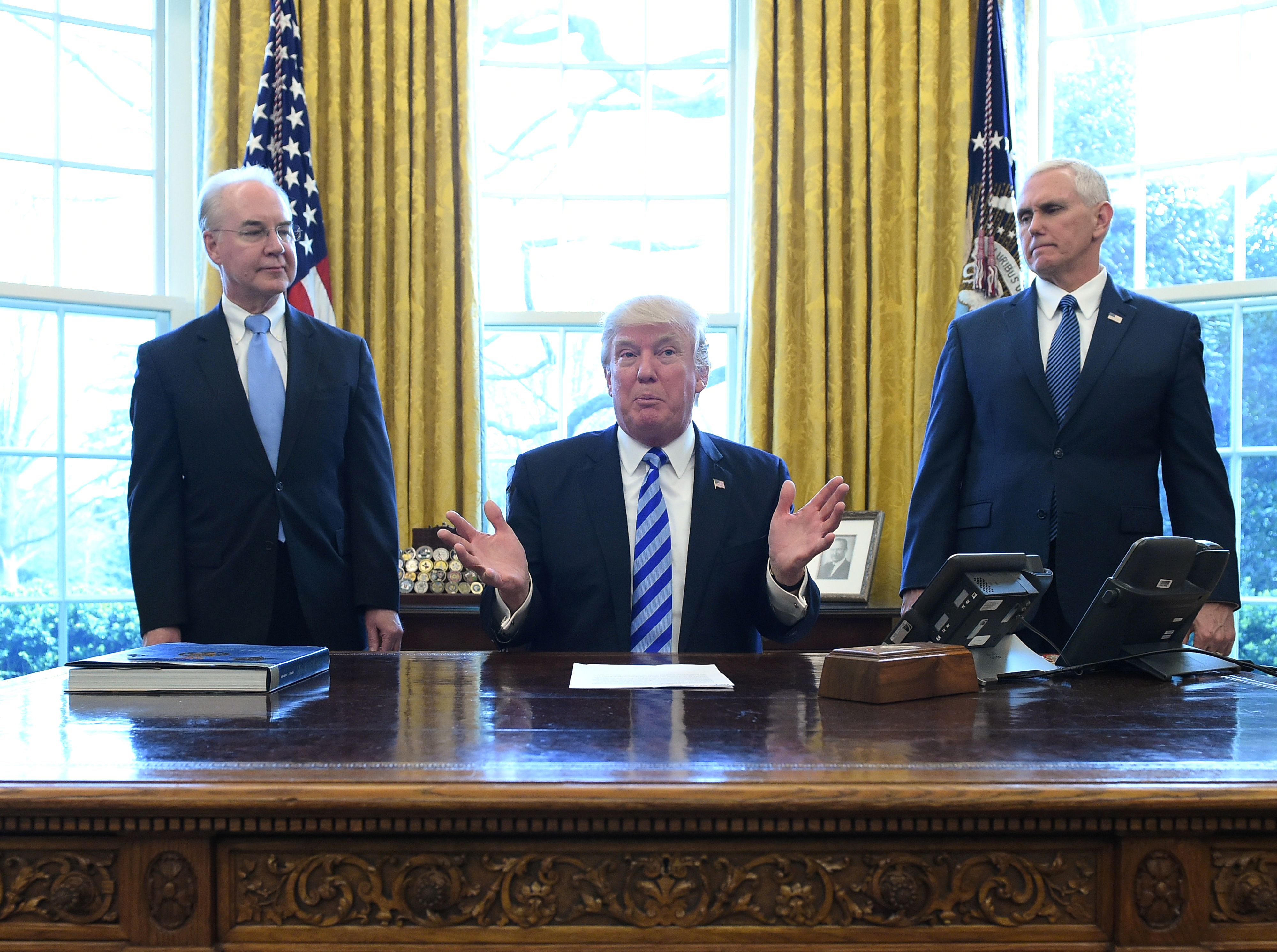Why Republicans dutifully defend Trump's most ridiculous lies
They can't avoid the Trump stench. And they know it.


In the past, presidents have told big lies mostly for one of two reasons. In the midst of scandal or failure, they told lies to protect themselves and deny that they had done wrong: I am not a crook, we did not trade arms for hostages, I did not have sexual relations with that woman. Or they lied to convince the public to go along with a policy initiative, whether a war or a tax cut or a new program, when the truth was insufficiently persuasive.
Unlike his predecessors, President Trump lies for any reason at all.
I imagine the sinking feeling his aides get when he blurts out another whopper. "Now I'm going to have to go out and defend this," they say with a sigh, then huddle together to arrive at the least laughable spin they can come up with, so they can rationalize the lie — which Trump will of course be unwilling to retreat from.
The Week
Escape your echo chamber. Get the facts behind the news, plus analysis from multiple perspectives.

Sign up for The Week's Free Newsletters
From our morning news briefing to a weekly Good News Newsletter, get the best of The Week delivered directly to your inbox.
From our morning news briefing to a weekly Good News Newsletter, get the best of The Week delivered directly to your inbox.
White House staff have little choice but to reinforce, justify, and repeat their boss' lies, though I suppose they could retain some shred of dignity and integrity by quitting. But what about Trump's fellow Republicans, particularly the ones in Congress? They're in an uncomfortable position, knowing that he's still popular with the GOP base and so not having his back could have electoral costs. Being a "maverick" might sound appealing, but not when it's going to cost you lots of votes or hinder your ability to work with the rest of the party on your legislative priorities.
So with just a few exceptions, Republicans have chosen to get in line when Trump goes off on one of his near-daily flights of fantasy. Or at the very least, they try to avoid the subject and run from reporters who might bring it up. But they can't escape the taint of this presidency, and the longer it goes, the more likely each one of them is to get dirty.
Consider this remarkable interview Trump did with Time, in which he argued that it was fine for him to claim that Barack Obama tapped his phones, because: "When I said wiretapping, it was in quotes. Because a wiretapping is, you know today it is different than wiretapping. It is just a good description. But wiretapping was in quotes." Before we go on, let's acknowledge that even this idiotic explanation is false; I refer you to this tweet, free of any quotation marks or vague references that might be interpreted to refer broadly to surveillance:
Nevertheless, this is one of Trump's common explanations for his lies, that he didn't actually lie if he got the lie from somebody else ("Well, I'm not, well, I think, I'm not saying, I'm quoting, Michael, I'm quoting highly respected people and sources from major television networks"). When asked whether the country will be able to believe him when he asks for their trust during a future crisis, he responded, "The country believes me. Hey. I went to Kentucky two nights ago, we had 25,000 people in a massive basketball arena." In other words: People can trust that I tell the truth because my fans still come out to see me.
A free daily email with the biggest news stories of the day – and the best features from TheWeek.com
This is not exactly a compelling defense. So every time Trump says something ridiculous, Republicans have to ask themselves: Do I help him on this or not? Some lies he tells are exaggerated versions of the lies they themselves tell, like the idea that three million people voted illegally. Republicans have all invested in the lie that says there is massive voter fraud; most just are careful enough not to put any numbers on it.
Other lies, though, are purely personal to Trump, like the idea that he had the largest inauguration crowd in history. They don't justify a policy or serve some other collective purpose; they're just about Trump feeling good. Defending him on that does nothing to help you with anyone but Trump himself.
Then there are questions that aren't about policy, but threaten the administration to a profound enough degree that Republicans may feel they have no choice but to rally to Trump's defense. The ever-widening Russia scandal falls into that category, which is why we've seen only a few Republicans admit that there's something troubling about a hostile foreign dictator manipulating our election, or that a report that the president's campaign manager had a $10 million per year contract with a Russian oligarch to advance Vladimir Putin's political interests might raise some alarming questions.
If Republicans are tempted to distance themselves from Trump over the Russia scandal, they'll probably be stopped by the realization that any serious threat to his presidency quickly becomes an equally serious threat to their agenda. A president crippled by a major scandal will be far less able to deliver on tax cuts for the wealthy or deregulation for corporations.
And that was the reason almost every Republican lined up behind Trump in the first place: They may have had their reservations about him, but he'd help them do all the things they'd been yearning to do for eight years. Yet now they can't escape the devil's bargain they made.
There are some Republicans more enthusiastic about Trump than others and some that are more sycophantic toward him. But sooner or later, almost all of them will wind up defending him, whether it's about particular lies he's told or scandals he's embroiled in. The stain of cooperating with Donald Trump will be on all of them, and it will never wear off.
Paul Waldman is a senior writer with The American Prospect magazine and a blogger for The Washington Post. His writing has appeared in dozens of newspapers, magazines, and web sites, and he is the author or co-author of four books on media and politics.
-
 Bari Weiss’ ‘60 Minutes’ scandal is about more than one report
Bari Weiss’ ‘60 Minutes’ scandal is about more than one reportIN THE SPOTLIGHT By blocking an approved segment on a controversial prison holding US deportees in El Salvador, the editor-in-chief of CBS News has become the main story
-
 Has Zohran Mamdani shown the Democrats how to win again?
Has Zohran Mamdani shown the Democrats how to win again?Today’s Big Question New York City mayoral election touted as victory for left-wing populists but moderate centrist wins elsewhere present more complex path for Democratic Party
-
 Millions turn out for anti-Trump ‘No Kings’ rallies
Millions turn out for anti-Trump ‘No Kings’ ralliesSpeed Read An estimated 7 million people participated, 2 million more than at the first ‘No Kings’ protest in June
-
 Ghislaine Maxwell: angling for a Trump pardon
Ghislaine Maxwell: angling for a Trump pardonTalking Point Convicted sex trafficker's testimony could shed new light on president's links to Jeffrey Epstein
-
 The last words and final moments of 40 presidents
The last words and final moments of 40 presidentsThe Explainer Some are eloquent quotes worthy of the holders of the highest office in the nation, and others... aren't
-
 The JFK files: the truth at last?
The JFK files: the truth at last?In The Spotlight More than 64,000 previously classified documents relating the 1963 assassination of John F. Kennedy have been released by the Trump administration
-
 'Seriously, not literally': how should the world take Donald Trump?
'Seriously, not literally': how should the world take Donald Trump?Today's big question White House rhetoric and reality look likely to become increasingly blurred
-
 Will Trump's 'madman' strategy pay off?
Will Trump's 'madman' strategy pay off?Today's Big Question Incoming US president likes to seem unpredictable but, this time round, world leaders could be wise to his playbook


